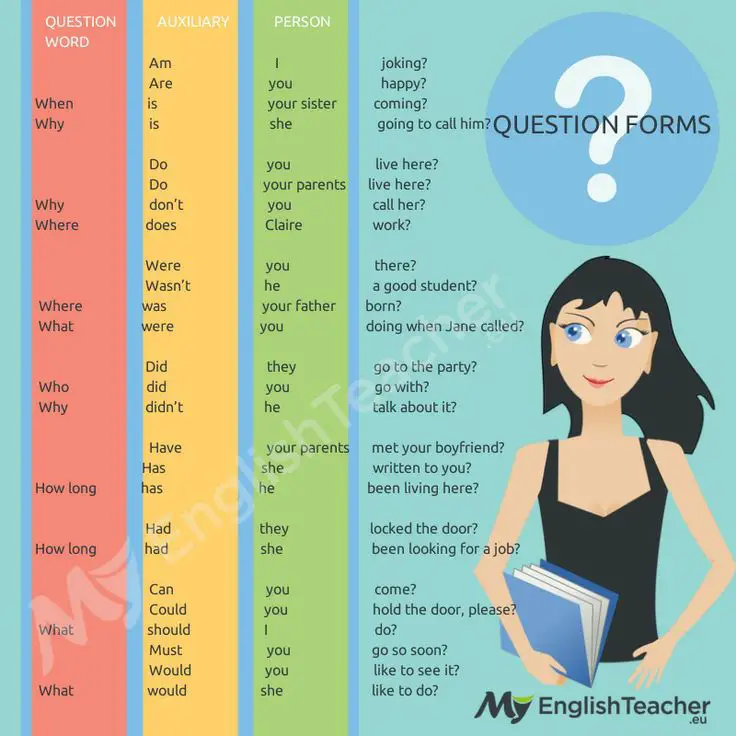I’m not good at asking questions in English. Can you help?


A lot of language learners find it difficult to ask questions in English.
Positive (affirmative) sentences are much easier to form; all you need is a subject and a verb (and of course some extra information). For example, ’I live in the capital.’
On the other hand, to form questions (interrogative sentences) you need to use auxiliaries (helping verbs) that often have no meaning in the sentence- they are only there to signal the time aspect and the modality.
For example, in the question ’Where do you live?’ the auxiliary is ’do’. You can’t really translate this word, but it’s a very important tool- we need it to form a question. It also shows that the question is meant in the present tense.
In the examples below, I would like to show you the most important auxiliaries and the correct word order in which they are used.
The word order is always the same:
(QUESTION WORD) + AUXILIARY + PERSON + VERB or ADJECTIVE
- Are you married?
- Is she married?
- Am I joking?
- Is your brother a teacher?
- Are you coming?
- Is your sister coming?
- Where are they from?
- Why are you running?
- Where is he going?
- What is Tom doing?
- What are you going to do?
- Why is she going to call him?
- Do you live here?
- Do your parents live here?
- Where do you work?
- Why don’t you call her?
- Where does Claire work?
- Why does your mother get up so early?
- Were you there?
- Was he a good student?
- Wasn’t he a good student?
- Who was she with?
- Where were you born?
- Where was your father born?
- What were you doing when Jane called?
- Where was he living when he met his wife?
- Did you see the match?
- Did they go to the party?
- What did he buy?
- Where did you stay?
- Who did you go with?
- Why didn’t you talk about it?
- Have you talked to Janet?
- Have your parents met your boyfriend?
- Has she written to you?
- How long have you known her?
- How long has he been living here?
- Had you met him before the party?
- Had they been waiting for a long time?
- How long had she been looking for a job?
- Can you come?
- Why can’t she come?
- Where can they be?
- Could you ride a bike when you were six?
- Could you hold the door, please?
- Will you call him?
- Will she leave Greg?
- What will you do?
- Should I buy a new car?
- What should I do?
- Why should you give up?
- Must you go so soon?
- Why must she behave like this?
- Would you like to see it?
- Would he do it for you?
- Would your mother like to come?
- Why would you like to meet him?
- What would you like to eat?
Recommended for you:
Rising and falling intonation in questions and answers
What’s the difference between direct and indirect questions
Questions and Answers to Prepare You for a Job Interview
Adverbs Of Frequency
Punctuation Marks – Quotation Marks – Question Mark
I do not understand writing double consonants in English.


























